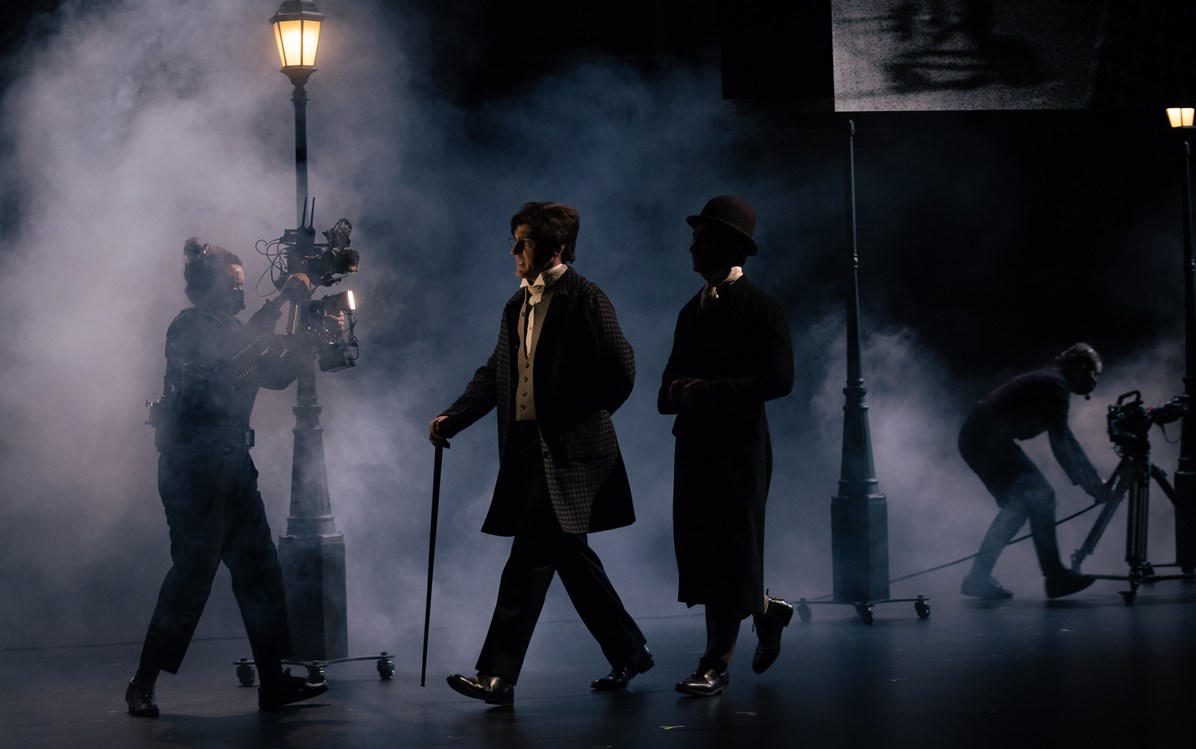As I walked into His Majesty’s Theatre to see the Strange Case of Dr Jekyll and Mr Hyde, I was presented with an anomaly. The grand red curtain that ushers in the ‘theatre experience’ was nowhere to be seen, leaving a naked forum with the guts of backstage open for all. Neon markers laid out on the floor like someone had vomited sticky confetti after a heavy night out. A black LED screen hung in the middle of the stage like a looming threat. This initial presentation suggested that I was far from the ye olde Gothic setting I was expecting to witness.
After a minute or so of quiet, just enough to allow the audience to titter with nervousness that something might be awry, Ewen Leslie appears on stage in a white shirt. Behind him, the ominous screen showed fellow actor Matthew Backer sitting at a table. Leslie erupts into the first of many monologues that detail the titular strange tale of Jekyll and Hyde, launching into a mesmerising, marathon theatrical experience that doesn’t let up across its breakneck two-hour runtime. There’s no intermission here, with writer and director Kip Williams (adapting from the notorious Robert Louis Stevenson classic) refusing to give the audience a moment to reset, instead seeking to immerse them in a giddy, mind-shifting experience that will leave you shaken and exhilarated come its close.
This aural documentation of events sways between perspectives, lurching from first to third person, often within the same sentence, causing a flurried experience of the mind as it details the story of lawyer Gabriel Utterson (Backer) who voices frequent concern about his close friend Dr Henry Jekyll (Leslie) in relation to the strange, ghastly figure, Mr Edward Hyde (also Leslie), that has spirited himself into Jekyll’s orbit. Backer and Leslie sway and flow in time with one another as if they’re performing a ballet, not a play. At times, dialogue spews forth like a podcast being played at 1.5x speed. You hear what’s being said, but it gallops at such a pace that your mind races to catch up. It forces you to lean in, to become transfixed by what’s on stage, to be truly mesmerised by the narrative.
Accentuating the feeling of being mesmerised are those dominant screens that loom over the stage, smothering the actors’ space in the chaotic blend of cinema and theatre. Instead of being a hindrance, they instead turn the Strange Case of Dr Jekyll and Mr Hyde into a paradox of a play; Steadicam operators move in time with the actors, capturing their performances that are presented on the moving screens. Leslie and Backer are challenged further, acting alongside pre-recorded sequences of themselves, with the screens facilitating the act of seamless character transitions for Leslie.
Occasionally, a cameraperson will hand one of the actors a prop, holding it in front of the lens so we see the item on the screen, thrusting viewers into front-on perspective. At the same time, we witness the cameraperson on stage delivering the object. The usually hidden aspects of theatre stand out in the open with visible stagehands pushing walls, doors, stairs, streetlights, and desks to create living spaces, the foggy streets of London, the claustrophobic indoor space of Hyde’s abode, and more. Clemence Williams provides an atmospheric score that responds aptly to the action on stage. As the narrative unfurls, and we are forced to question the humanity of Hyde – is he a person or is he a ghoul? –, we are also forced to ask ourselves, is this theatre or is this film?
By the time the image of Leslie’s face looms on the screens – evoking imagery akin to James Stewart’s bewildered detective Scottie in Hitchcock’s Vertigo – as the actor stands centre stage the answer becomes clear: this is both theatre and film, and yet it is neither at once. At once, I was reminded of Woody Harrelson’s Lost in London, a film that projected into cinemas around the globe as it was shot live on the streets of London, or Mike Figgis’ multicamera experience Timecode, or even Lars von Trier’s Dogville which tore down the set walls and presented homes as chalk outlines on the floor.
It’s natural for me to observe the Strange Case of Dr Jekyll and Mr Hyde through the prism of film, given that’s my main cultural vocation, but it’s also the desire of Williams, who uses these unfamiliar and radical techniques to tell a familiar tale that has been imitated and presented throughout all forms of media, almost to the point of exhaustion. By presenting the torture of this man who finds himself torn apart by the duality of minds that exists within his body in this captivating and intense film by way of theatre manner, Williams pulls the audience into Jekyll and Hyde’s mindset, conjuring an orgy of the senses that is both hangover and cure at once. At once, this presentation is a contradiction, one that continually reminds you that you are watching a theatrical experience even as you are pulled further into the grips of its entrancing narrative. To reveal where this version of Jekyll and Hyde takes its audience would be to spoil some of the most frenetic and rapturous moments of theatre I’ve ever seen.
At glorious close the Strange Case of Dr Jekyll and Mr Hyde, I had witnessed Ewen Leslie and Matthew Backer delivering two of the most searing and impressive live performances I will have the fortune of experiencing in 2023. This is standout, must see theatre that, if it were a film, I would have rushed straight back inside to witness all over again.
Tickets for this performance were provided by Perth Festival for an honest review.
Adapter & Director: Kip Williams
Cast: Matthew Backer, Ewen Leslie
Designer: Marg Horwell
Lighting Designer: Nick Schlieper
Composer: Clemence Williams




